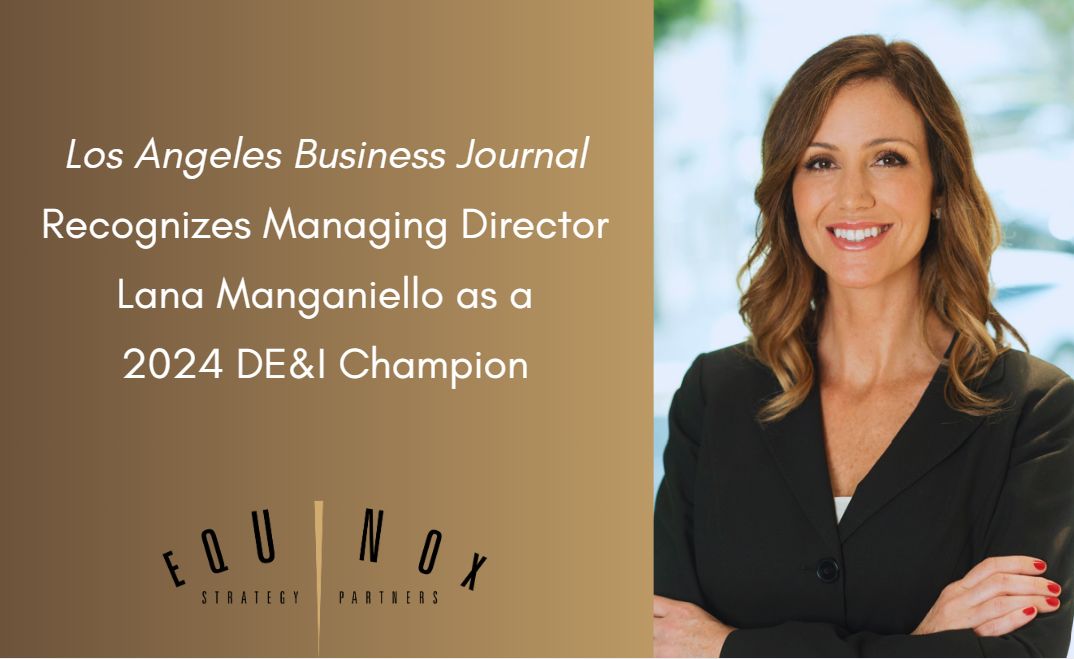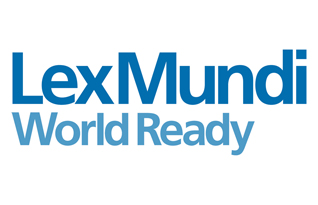EQUINOX STRATEGY PARTNERS
Shaping The Future of Law: The Crucial Intersection of Business Development and DEI
Presented by: NALP Bulletin | October 2023

SHAPING THE FUTURE OF LAW: THE CRUCIAL INTERSECTION OF BUSINESS DEVELOPMENT AND DEI
By Lana Manganiello
Read the full article as a PDF here.
As the world embarks on a new chapter post-pandemic, the legal profession stands at a pivotal juncture. The shifts in communication, collaboration, and relationship-building introduced by remote and hybrid work environments have not just reshaped the fundamental dynamics of the profession; they’ve opened a transformative era. This era offers an opportunity as significant as it is timely to address a long-standing challenge within law: diversity, equity, and inclusion (DEI).
The insights from my conversations with accomplished and diverse attorneys from coast to coast have revealed a path forward, one rich with opportunity and urgency. Business development skills – a vital nexus of self-awareness, visibility, communication, and strategic networking – emerge not merely as tools to improve attorney success but as catalysts for meaningful change in the profession. By providing lawyers, especially those from diverse backgrounds, with essential business development skills, we enable them to overcome obstacles and create an environment where inclusivity is not merely an aspiration but an active practice. This approach can transform the very nature of the legal profession, starting with a focused effort to cultivate the abilities needed to build, grow, and forge meaningful connections.
Empowerment Through Clarity, Autonomy, and Confidence Building
Business development in the legal profession begins with introspection and clarity. Lawyers who engage in self-reflection to discern their career aspirations can develop a meaningful business development strategy aligned with their interests and values. This clarity provides purpose and a vision that helps navigate challenges at work.
Gabriela Sanchez, Shareholder at Lane Powell, emphasizes the importance of confidence building, stating, “I have been told no a lot of times, and it hurts. But you know what? You dust yourself off and you get right back up because ‘no’ isn’t going to kill you.”
Proficiency in business development empowers lawyers with the autonomy to pursue clients and matters that align with their principals and goals. This individuality is crucial in fostering job satisfaction by allowing lawyers to engage in meaningful work that resonates with them, while also granting them the ability to choose whom they work with and exercise discretion in what they choose to pass on.
Mentorship and Sponsorship
Early career lawyers from diverse backgrounds often grapple with a lack of first-hand experience or understanding of the value of strategic networking and cultivating a visible presence. This challenge was candidly illustrated by Nick Samedi, Partner at Lowenstein Sandler, who shared his personal experience. He said, “As a first-generation American, raised in a traditional Haitian home, merit came from keeping your head down and working harder than everyone else until you were recognized and rewarded. I learned that while hard work and legal expertise are certainly essential elements to success, ultimately, more is required to be successful. My first few years at the firm, I did what I was taught to do and what had been effective for me up to that point, work hard and produce excellent work product. But not developing relationships with the assigning partners and not developing my brand beyond being a workhorse in the office were hugely detrimental to my progress at the firm.”
These reflections offer a glimpse into how essential business development skills are, not only for client acquisition but also for internal growth and mentorship within the firm. On the transformative power of mentorship, Samedi adds, “I was very lucky to have a mentor to talk to me about what I could be doing better and how to redirect my efforts and reallocate my time. His very blunt, constructive feedback to me was ‘Nobody knows who you are, Nick. You’re in your office, you do the work, you’re an excellent employee, but you need to act like an owner. You need to self-advocate, speak up in meetings so people know what you’re doing, and start building relationships.’” The insight Samedi provides not only underscores the importance of business development skills but paints a vivid picture of how these skills can change the trajectory of a legal career.
Prioritizing Business Development Early in Success
Miko Ando Brown, Associate General Counsel of Community Trust at Airbnb, underscores a significant point that resonates with the industry’s change-makers: prioritizing business development from the early stages of a legal career. Brown illuminates, “A prevailing myth that has undermined the efforts of women and minority lawyers is the belief that business development is reserved for more senior lawyers or partners. This misconception can hinder early-career professionals from standing out and being successful in a competitive legal environment. In reality, even a first-year associate can begin laying the groundwork for future opportunities. For example, a first-year associate might approach a partner with a proposal to coauthor an article on product liability or seek advice on maintaining contact with a first year in house connection at a major company. By taking these steps, early career, diverse lawyers can distinguish themselves from their peers and demonstrate the initiative and foresight that are vital for success in today’s legal landscape.”
By empowering lawyers, especially those from diverse backgrounds, with business development skills early in their careers, we can enable them to carve out a trajectory that is both personally and professionally rewarding. The future of law is undoubtedly diverse, and it is imperative that firms take action so they can continue to thrive in an ever-changing landscape.
Brown’s personal experience lends credence to this approach, sharing an impactful piece of advice she received, “Spend the first five minutes of every day doing one thing to either build your network or strengthen it. I followed that advice early on, and it paid off.” This daily practice, seemingly straightforward yet profoundly impactful, serves as a testament to the importance of developing the habits and skills needed to consistently focus on building relationships and networks. Far from being just an optional skill, it’s a foundational element for success and distinction in the field.
Creating Opportunities and Gaining Leverage for Influence
In an increasingly competitive and diverse legal landscape, the ability to attract clients and generate revenue is not merely a skill but a lever for influence and change. As lawyers, particularly those from diverse backgrounds, refine their business development capabilities, they don’t just become adept at growing their practice; they become drivers of structural transformation within the industry.
Sanchez, a trailblazer in this space, underscores this essential connection between individual success and broader influence, recommending diverse lawyers “develop your book of business. Be the master of your own destiny, and then you can be the one effectuating meaningful change. You will have more influence across your organization, so it’s important that you are successful at client development.”
Beyond personal success, Sanchez stresses the importance of collaboration and mentorship among diverse lawyers. She emphasizes, “We need to work to get us (diverse lawyers) to shareholder, onto executive committees, into positions of power so that we can make real, fundamental, and structural changes in the profession for the long term. People will have to listen to you when you are the one driving the revenue.”
The Future is Here
The legal profession’s journey towards diversity, equity, and inclusion hinges on more than just good intentions. It demands a strategic investment in business development skills, particularly for diverse lawyers. Law firms must recognize that nurturing these skills is not just a vital business strategy but an ethical responsibility. By empowering lawyers with the tools to build, grow, and connect, organizations enable them to flourish in their roles and ascend into leadership positions. This is more than a pathway to individual success; it’s a blueprint for a more inclusive, innovative, and successful legal profession. The future is here, and it begins with a deliberate commitment to development. The choice to embrace it will define the leaders of tomorrow.


















